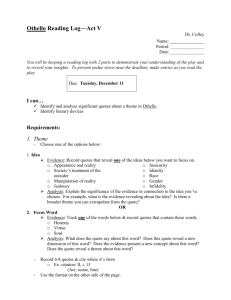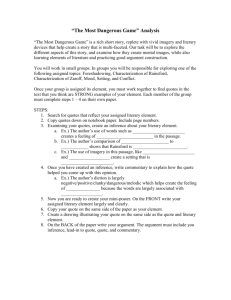Summer Reading Assignment 2014 MYP Year 5, Honors English 10
advertisement
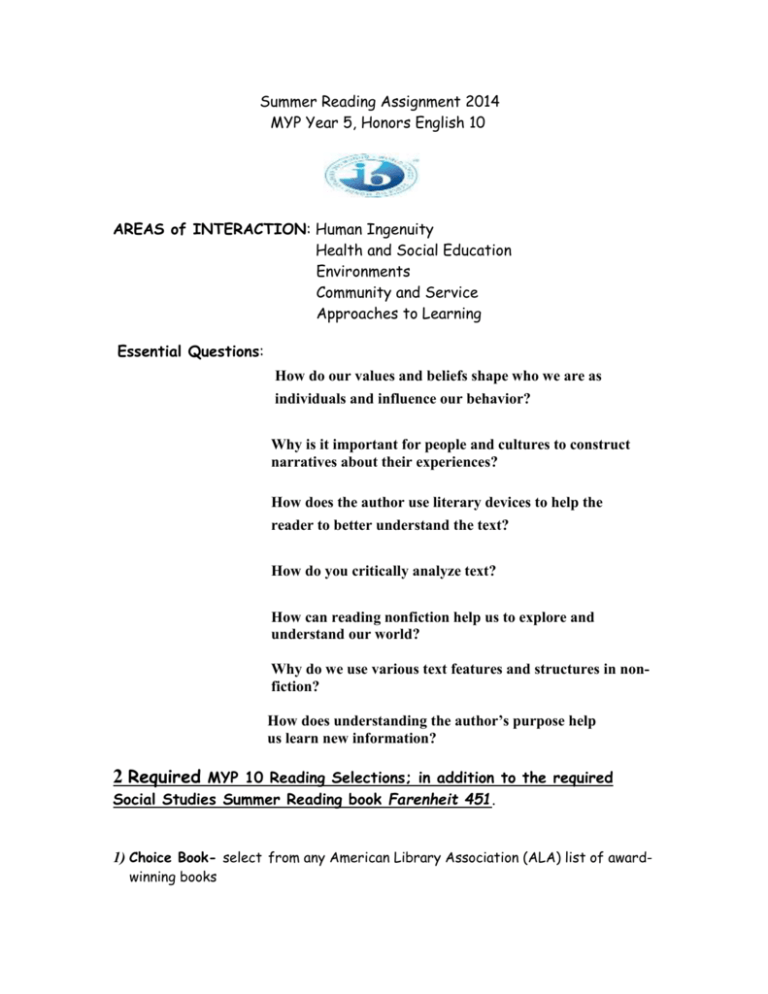
Summer Reading Assignment 2014 MYP Year 5, Honors English 10 AREAS of INTERACTION: Human Ingenuity Health and Social Education Environments Community and Service Approaches to Learning Essential Questions: How do our values and beliefs shape who we are as individuals and influence our behavior? Why is it important for people and cultures to construct narratives about their experiences? How does the author use literary devices to help the reader to better understand the text? How do you critically analyze text? How can reading nonfiction help us to explore and understand our world? Why do we use various text features and structures in nonfiction? How does understanding the author’s purpose help us learn new information? 2 Required MYP 10 Reading Selections; in addition to the required Social Studies Summer Reading book Farenheit 451. 1) Choice Book- select from any American Library Association (ALA) list of awardwinning books 2) Informational Text selection Summer Assignments Read 1 Literary choice book, 1 Informational text. Writing assignment- 1 Quote Log. Complete an oral presentation with a written explanation. All writing should be formal, complete, and original. REQUIRED ASSIGNMENT #1 Skill: Critical Analysis of a Literary Work American Library Association Choice Book: Quote Log (10 quotes with analytical response) Quote Log Instructions: When you write about literature, it is important to include specific quotes from the text to validate your statements. For the ALA Choice Book, keep a quote log of 10 important quotes that you find as you read. These quotes should not be random lines, but specific examples that relate to one of the themes of the novel. Balance the use of quotes with your analysis. When analyzing quotes, just remember: WPAE! 1. 2. 3. 4. Writing the quote Paraphrase Analysis Evaluation Requirements: -the choice book should be age appropriate, new to the reader, and from the ALA (American Library Association) reader list -each quote analysis should be approximately 100 words in length - MLA format (typed, double-spaced, Times New Roman, 12 point font) Ways to introduce quotes: When (event in book) happened, (character) states, "..." Ex: When Lady Macbeth kills herself, Macbeth states, "Life's but a walking shadow, a poor player that struts and frets his hour upon the stage and then is heard no more (V.V.19-20). (Character) explains: "..." (citation). (Your own words) "direct quotes from book" ... Ex: Macbeth pines over his miserable fate, calling life a "walking shadow" (citation). Ways to paraphrase: Directly look at quote and replace the text with your words. It is vitally important to maintain the same meaning: Ex: In other words, Macbeth compares his existence to the condition of being a mere ghost. He goes on to compare people to actors who worry about their brief moment in the spotlight only to cease to exist before he realizes his life is over. Ways to analyze: Look at the subtle parts of the quote, and explain why the author used them in his writing--Tone, diction, mood, figurative language (metaphors, similes, imagery, alliteration, onomatopoeia, personification...there are A LOT). Ex: The metaphors Shakespeare uses, comparing life to a "walking shadow" and man to "a poor player" emphasize the fleeting nature of life. Shadows are gone as soon as they appear, and actors only assume their character: the people they represent have no true meaning. Ways to evaluate: Show the importance of the quote with respect to your claim or assertion. Explain the significance...Tell the reader why they bothered to read your analysis. This is where you tie your thoughts together in a nice bow. Ex: Here, Macbeth realizes that his pitiful existence, from the moment he decided to kill King Duncan to the moment when his beloved wife killed herself, has been consumed by his reckless ambition. This directly shows the damaging power of ambition. If Macbeth had been content with his previous title, which was prestigious enough, a host of tragedy would have been avoided. Source: UC Berkeley 2011 Assessment Criteria: writing reflects a critical, analytical understanding of the text; through clear reasoning writer draws sophisticated, insightful inferences from concrete details to support the connected ideas inferences are developed so that all claims and points made are well-supported and persuasive analysis focuses on both thematic and stylistic elements of the text, demonstrating writer’s ability to interpret the function of literary devices used to express thematic meaning appropriate balance of quotes and writer's analysis writer is clearly engaged with and moved by his/her thinking process Worth 100 points Due Date: On or before Thursday, September 4, 2014 Required Assignment #2 Nonfiction Book Selection and Presentation Assignment: Choose a full-length, nonfiction work. You may choose a book from the choices listed below in the chart or another. The titles in the list are simply a resource list. Read it, and prepare a presentation. This presentation may be in any format you are comfortable with; Power Point, Video, Movie, collage, original drawing. The presentation must contain all 3 of the components listed below: 3 components: Oral, Visual, Written The written component should be a one-page typed summary of your presentation. Due Date: On or before Thursday, September 4, 2014 Points: 50 Selection Possibilities by Content Area and Author Informational Texts: English Language Arts Henry, Patrick. “Speech to the Second Virginia Convention.” Washington, George. “Farewell Address.” Lincoln, Abraham. “Gettysburg Address.” Lincoln, Abraham. “Second Inaugural Address.” Roosevelt, Franklin Delano. “State of the Union Address.” Hand, Learned. “I Am an American Day Address.” Smith, Margaret Chase. “Remarks to the Senate in Support of a Declaration of Conscience.” King, Jr., Martin Luther. “Letter from Birmingham Jail.” King, Jr., Martin Luther. “I Have a Dream: Address Delivered at the March on Washington, D.C., for Civil Rights on August 28, 1963.” Angelou, Maya. I Know Why the Caged Bird Sings Wiesel, Elie. “Hope, Despair and Memory.” Reagan, Ronald. “Address to Students at Moscow State University.” Quindlen, Anna. “A Quilt of a Country.” Informational Texts: History/Social Studies Brown, Dee. Bury My Heart at Wounded Knee: An Indian History of the American West Connell, Evan S. Son of the Morning Star: Custer and the Little Bighorn Gombrich, E. H. The Story of Art, 16th Edition Kurlansky, Mark. Cod: A Biography of the Fish That Changed the World Haskins, Jim. Black, Blue and Gray: African Americans in the Civil War Dash, Joan. The Longitude Prize Thompson, Wendy. The Illustrated Book of Great Composers Mann, Charles C. Before Columbus: The Americas of 1491 Informational Texts: Science, Mathematics, and Technical Subjects Euclid. Elements Cannon, Annie J. “Classifying the Stars.” Walker, Jearl. “Amusement Park Physics.”. Preston, Richard. The Hot Zone: A Terrifying True Story Devlin, Keith. Life by the Numbers Hoose, Phillip. The Race to Save Lord God Bird Hakim, Joy. The Story of Science: Newton at the Center Nicastro, Nicholas. Circumference: Eratosthenes and the Ancient Quest to Measure the Globe U.S. Environmental Protection Agency/U.S. Department of Energy. Recommended Levels of Insulation For more ideas you can: do a Google search of Best Selling Nonfiction or Memoirs Go to the bookstore and look in the religion, culture, music, sports, or psychology section. Pick something you LIKE; Nonfiction is not limited to autobiographies and biographies. Presentation Project Requirements Your presentation must: • Identify title and author • Establish setting (time and place) • Introduce major characters and provide a brief description of each. Analyze the tone of the narrative voice • Briefly narrate story (do not give away the ending) • Provide author’s background information • Identify author’s purpose (reason for writing) and tone (author’s attitude) • Comment on author’s writing style (word choice, sentence structure, organization, use of figurative language, imagery, symbolism, etc.) • Your personal opinions of the reading; justify those opinions Presentation Rubric: Please refer to the IB Oral Presentation Rubric for scoring: http://jrib.wikispaces.com/file/view/Individual+Oral+Presentation+Rubric+%E2%80%93+HL.pdf Deadline: All Summer Reading assignments are due on or before Thursday, September 4. There will be no extensions. Contact Information: My e-mail address is kristin.parson@bsd.k12.de.us if you have any questions about the assignments. Have a great summer!

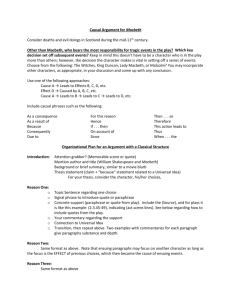
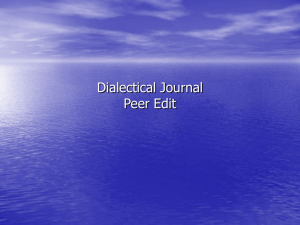
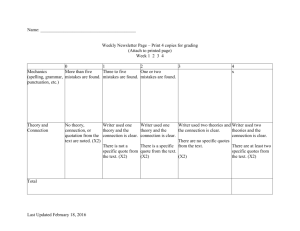
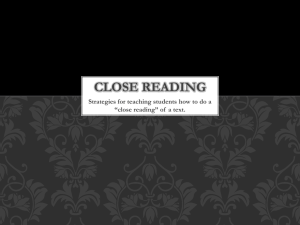
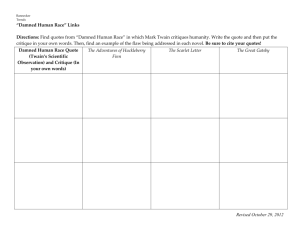
![Quote Integration Handout (Carmen)[2]Payne.doc](http://s3.studylib.net/store/data/008031414_1-35de2d3b7caafe44cd7f796bb2c99f35-300x300.png)
